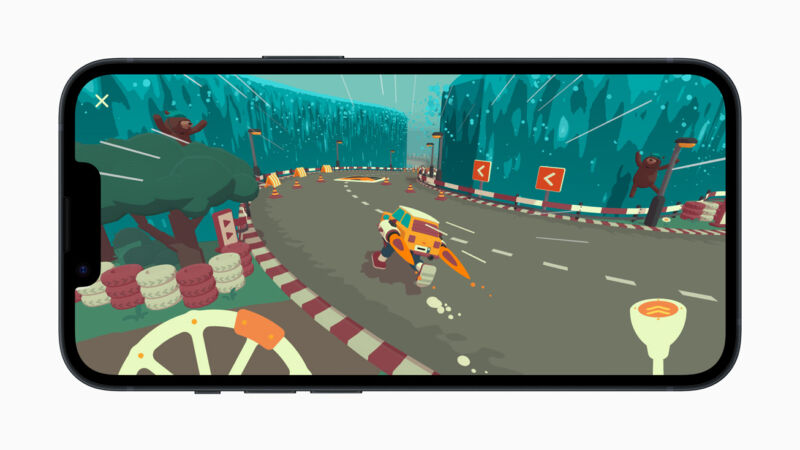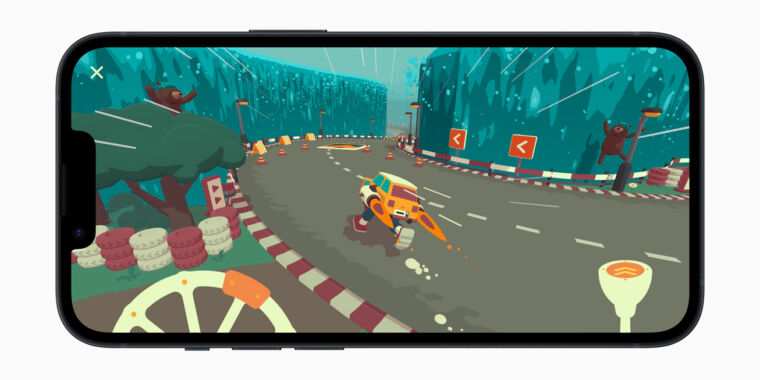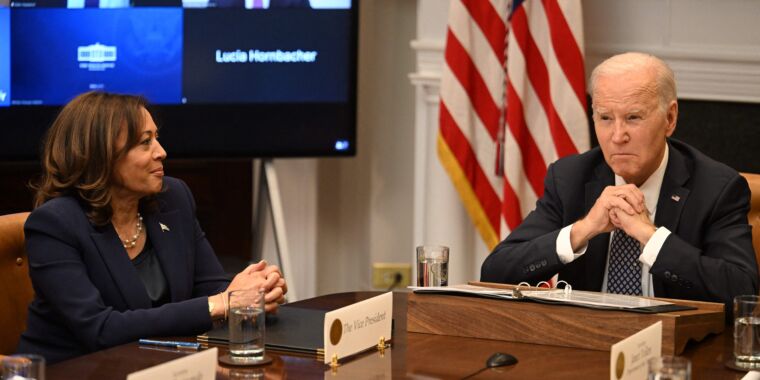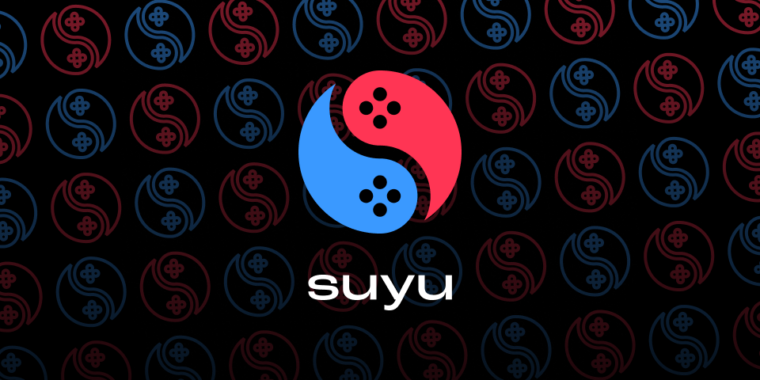
Apple
Apple Arcade is still around, and it’s still a priority—at least, that’s the message we imagine Apple’s surprise launch of 20 new games on the same day seeks to send.
The new games include (but aren’t limited to) a Teenage Mutant Ninja Turtles-branded battler titled TMNT Splintered Fate, a Disney-themed Scrabble-like game called Spellstruck developed in partnership with a Words With Friends co-creator, a city builder called Cityscapes: Sim Builder, and a follow-up to the Arcade smash hit What the Golf? titled What the Car? (If you haven’t played What the Golf? yet, you probably should—it’s available on other platforms now, too.)
There are also a few updated versions of classic premium games from prior eras of iPhone gaming, like LIMBO, Kingdom Two Crowns, Farming Simulator 20, Octodad: Dadliest Catch, Temple Run, and Bennett Foddy’s Getting Over It—think of those like Apple’s equivalent of a TV-streaming service also offering episodes of classic TV shows like The Office or Star Trek.
It’s the biggest haul we’ve seen come out for Arcade in quite some time. The service has recently seen more of a trickle, with one or a small handful of games popping up here and there.
As in Apple Arcade’s recent past, the content strategy here seems to be to try to take the best ideas and the best talent from the open App Store marketplace and leverage them to prove the idea that “mobile games are bad” is entirely wrong—in one part by curating for quality to counter mobile’s signal-noise-ratio problem on that front, and in the other part to strip games of microtransactions—even in genres that were initially developed around that monetization model.
Apple correctly diagnosed that mobile games’ reputation problem comes from users’ inability to wade through a whole lot of bad games (whether they’re bad because the content itself is bad or because monetization sabotages what would otherwise be a good experience) to find the good stuff. There were always good mobile games; users just struggled to find them, and many threw their hands up and stopped trying after having too many bad experiences in the process.
Still, Apple Arcade’s growth has been limited, in part because the statement that “mobile games are bad” was always wrong to begin with. There are hundreds of outstanding mobile games on both iOS and Android, including many free-to-play ones with reasonable and non-intrusive monetization—so many that it may have proven difficult to upsell iPhone owners on even Arcade’s ultra-cheap $4.99 monthly price tag. If there are a dozen games out there that you already enjoy, and they’re all free, why would you pay $5 a month for others?
-
Here are some of the other games added. First up: TMNT Splintered Fate, a “co-op roguelike adventure.”
-
Here’s Cityscapes: Sim Builder, a SimCity-style game. It’s depicted here running on a Mac—yep, Arcade games run on Macs too, with varying port quality.
Apple -
This screenshot is from Kingdom Two Crowns+—that’s the title in here for strategy fans.
Apple -
It doesn’t get much more classic on the iPhone than infinite runner Temple Rush+.
Apple -
Bennett Foddy’s Getting Over It+ is a cult classic—just be ready to rage at its hilariously absurd difficulty and bizarre presentation.
Apple -
One of the original classics of the modern indie revival, LIMBO+ is a moody, black and white platformer.
Apple -
This is Farming Simulator 20+, one of the more recent App Store games updated for Arcade.
Apple -
Octodad: Dadliest Catch+ is one of the more popular games in that peculiar genre where the controls are infuriating on purpose. (It’s a lot of fun, and it’s funny.)
Apple -
Disney Spellstruck is Words With Friends but Disney—enough said.
Apple
Essentially what Apple is providing here is a curation service. Arcade is like having a mobile game personal shopper; you don’t have to spend hours trying mediocre games in the App Store and Googling to figure out where to start. You can just join Arcade and expect a certain minimum level of quality. But you might argue that the same people with enough of a desire for great mobile games to pay a monthly fee for that are often the same people who were already willing to put in the work themselves.
Apple Arcade is not the only game subscription service doing this, though. There’s also Netflix Games, which has rapidly grown over the past year and is pushing out titles from popular iOS developers. That includes some that used to put their new games on Arcade, like Alto’s Odyssey developer Snowman, which launched the new game Laya’s Horizon via Netflix this week.
Games like Laya’s Horizon are playable on the iPhone and downloadable via the App Store, but they require a Netflix subscription to play. Recently, Netflix Games have been generating more buzz among influencers and the press than what Apple has been putting out on Arcade.
Of course, media buzz doesn’t necessarily equal success, and neither Apple nor Netflix has made many details about individual games’ performance public.
While Apple Arcade got some buzz early after it launched in 2019, reports over the ensuing months suggested Apple was struggling to gain as much ground with it as it would like, and much of the buzz quieted down. The company likely hopes this new barrage of games will rekindle some interest, but the competition is fierce, so we’ll have to wait and see.








